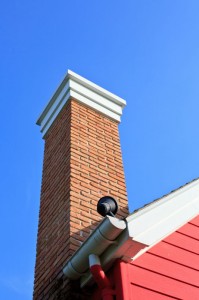The autumn weather has arrived in full force. The chilly wind has colorful leaves falling from the trees and has everyone digging up their cozy jackets. This time of year also has homeowners thinking about how to heat their homes. In the frigid New England winters, this is a big concern. Many homes utilize fireplaces for some or even all of their heating needs. With a fireplace, however, comes some maintenance responsibilities. Fireplaces with masonry chimneys, in particular, are prone to specific types of issues, so you need to keep an eye out for the safety of your home and family.
A major issue that masonry chimneys face is water damage. Many homeowners never even consider that their strong, robust chimney could ever succumb to damage from a little water. Chimneys are built to live outside, after all. Unfortunately though, water can cause serious problems. The materials used to build a masonry chimney like brick, mortar, and concrete are all very porous, meaning they readily absorb water. While stones do not absorb water, the mortar holding them together does. The trouble with a masonry chimney filled with water occurs during the freeze and thaw cycles of winter. The water expands as it freezes, which means the bricks, the mortar, and the concrete all expand as well. Over time, this expansion causes damage.
You may see water damage in several different forms. The first clue is cracked or missing mortar. The constant movement of the materials during freezing weather loosens the bonds of the mortar. Thus, the mortar wiggles its way out from between the bricks, appearing as a crack or as a decent sized hole. A mason can usually fix isolated mortar cracks or holes using a process called tuckpointing.
Another sign of water damage is a cracked chimney crown. This concrete slab on top of your chimney acts as an umbrella to keep water from entering the flue. If it has cracks from water damage, water is entering your chimney, which leads to a whole new set of problems. Ask your mason if he can patch the cracks. Otherwise, the chimney crown may need to be completely replaced.
The most devastating sign of water damage to the chimney is partial or total collapse of the structure. This most likely occurs after years of exposure to water and freezing temperatures, but a poorly built chimney could suffer from collapse in less time. Chimneys are very heavy, meaning a collapse could be a danger to anyone on the ground and to the structure of your home. Any signs of a collapsing chimney must be addressed by a mason right away.
Luckily, you can take some steps to prevent water damage, like sealing your chimney and adding a chimney crown. Ask your mason what can be done to protect your chimney. If you live in the Boston or North Shore area or around Portland, Maine, contact Billy Sweet Chimney Sweep for a professional consultation. The experts at Billy Sweet Chimney Sweep can help make your chimney last for many more years.

